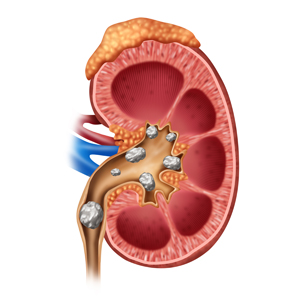Kidney Stone Center
Kidney stones occur when hard deposits of mineral salts form in the kidneys. The stones are formed when minerals in highly concentrated urine crystallize and combine together. Kidney stones affect all parts of the urinary tract. However, they do not cause permanent damage if they are noticed early. Passing kidney stones is very painful. In many instances, the only remedy for kidney stones is pain medication and consumption of lots of water for easier discharge. However, there are cases when the stones get stuck in the urinary tract leading to complications. In such instances, surgery is needed.
Read: What are Kidney Stones?

Kidney Stones Center
Symptoms
The stones have no major effects while they are in the kidney. The symptoms become evident when they move to the ureter (tube connecting the bladder with the kidneys). They include:
- Pain in the groin and lower abdomen
- Severe pain in the back, side and below the ribs
- Pain during urination
- Foul-smelling urine
- Red, pink, brown or cloudy urine
- Frequent urge to urinate
- Urinating in small quantities
- Fever and chills in case of an infection
Read: Kidney Stone Signs & Symptoms
Causes
Kidney stones form when urine is highly concentrated with crystal forming minerals. Examples of minerals likely to crystallize are uric acid, calcium and oxalate. Types of kidney stones include:
- Calcium stones. Calcium stones are the most prevalent kidney stones. They are usually in the form of calcium phosphates and calcium oxalates. Oxalate is found in food and is also produced by liver on a daily basis.
- Struvite stones. They form as a response to an infection. They grow quickly and if left unattended to may lead to serious problems.
- Cystine stones. Hereditary disorders, which lead the kidney to excrete excess amino acids (cystinuria), lead to the creation of these stones.
- Uric acid stones. They occur to persons who do not take enough fluids.
Read: Kidney Stone Causes
Risk Factors
- Family history. If your family suffers from kidney stones, then there is a high chance you may develop them too.
- Consuming less water each day increases the risk of kidney stones
- Diets high in protein, sugar and salt are linked to kidney stones.
- Obesity
Diagnoses:
Read: Kidney Stone Diagnoses
Treatment:
Read: Kidney Stone Treatment & Removal
Also Read: Foods That Can Cause Kidney Stones

